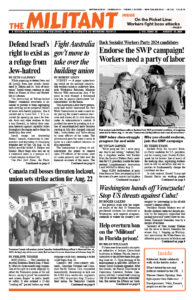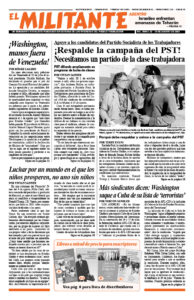SYDNEY — Agnes Sullivan, a member of the Communist League in New Zealand for four decades, died in Christchurch there in June. She was 91.
“Agnes met the party when she was in her 50s,” Janet Roth, a leader of the Communist League here, said. “Through its program and activity, she found the expression of her working-class political convictions. From then on, building the party and its world movement was the focus of her life.”
Sullivan was born into a coal-mining family on New Zealand’s West Coast. Her father, Angus McLagan, was a leader of the miners’ union and the early communist movement in the 1920s. He became a national trade union leader in the 1930s and a Labour Party government minister in the ’40s. Her mother, Sophie, was also active in the labor movement.
Sullivan studied languages in college and, after raising three children, took up work as an archaeologist and anthropologist, doing research and teaching at museums and universities. This included a number of years researching early Maori settlement in Auckland, on which she was regarded as an authority.
In 1984 she came upon a copy of Socialist Action, the newspaper of the party of that name that would become the Communist League. She was drawn to the party’s involvement in unions and other working-class struggles, including the fight for Maori rights. She contacted the party and joined.
For Sullivan this was life-changing. She became part of the League’s union fractions working in industrial factories and other jobs in Wellington for years before moving to Christchurch. She participated in and wrote for the Militant about struggles by working people.
Although she was quiet and self-effacing, those who worked with Sullivan were struck by her political knowledge and astute observations. “She was one of the most political people I have known,” Patrick Brown, who worked with her in the Communist League, said. “She greedily consumed news about political developments and then worked within the movement to see them through a proletarian, communist lens.”
Sullivan didn’t just read the Militant each week, she studied it. She did the same with Pathfinder books. She wanted to deepen her understanding of political developments, the class struggle and building the party.
When she got the new Pathfinder title, The Fight Against Jew-Hatred and Pogroms in the Imperialist Epoch: Stakes for the International Working Class, she sent a message to the Communist League in Australia. “The first chapter by Dave Prince makes gripping reading,” she said.
“After joining the party, Agnes remained loyal and committed for the rest of her life,” said Roth, “and she had unswerving confidence in the working-class political course being advanced by the Socialist Workers Party and the Communist Leagues today.”

